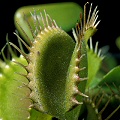Q: Why do the leaves on my Venus flytrap snap shut slowly, or not at all?
A:
Talk about a let-down! You get your new, vicious plant home and try to
goof with the leaves, and they don't close! What is going on
here?
The bad news is that you have a variety of Venus flytrap that does not
snap shut. These have been genetically engineered not to close because
market research has shown that people like more brightly colored
plants, and they don't care about qualities like snapping leaves. This is
the same reason store-bought tomatoes look so good but taste so bland, and
why genetic companies are making fortunes by designing really weird corn.
No, not really.
Now for the truth.
Venus flytrap leaves can only go through the snapping-shut-and-opening
routine about half a dozen times before they stop functioning as trapping
leaves (more about that below). You can bet that your new, store-bought
plant has been jostled, abused, and triggered by a dozen pencil-wielding
humans before you brought it home. If none of the traps work anymore, you
will have to wait until it makes new traps. This may take a while.
On the other hand, another reason your plant might be so sluggish is that your
plant is dying. Don't e-mail me for advice on what to do---read the FAQ. I couldn't
possibly diagnose your plant based on your photograph and description.
Incidentally, on very cold days traps tend to close very slowly.

Exhausted!
Once a leaf stops functioning as a trapping leaf, it does not die.
The trap stays green, but gets a funny outer-curling edge (see the
photograph to the right). Many times
the leaves spread wide open so the lobes are about 180°
apart. The leaf now behaves like a simple, photosynthetic leaf. As long
as nothing strange happens, this leaf may persist for many months. It
is still providing the plant with the valuable service of making sugars
by photosynthesis, so do not cut the leaf off!
I do not think that speed of trap closure correlates with the plant being
"hungry." That would be cool if it were true, but I do not think
it is. Dang!
A final geeky note for you. The underlying reason that traps can only close a finite
number of times, and not over and over and over, is rooted in the
"acid growth" stage of leaf closure. After several
closing events, the cells of the plant are as elongated and stretched as they can get. They can
grow no further.
Page citations: D'Amato, P. 1998a; Rice, B.A. 2006a; Schnell, D.E. 1976.